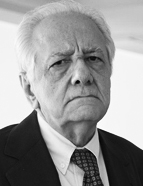

Evaldo José Cabral de Mello was born in Recife (Pernambuco, north-east region of Brazil) on 20 January 1936. A retired diplomat, he is the youngest of seven children born to Luiz Antônio Cabral de Mello (a law graduate and member of the Associação de Imprensa de Pernambuco [Pernambuco Press Association]) and Carmen Carneiro Leão Cabral de Mello. He has established a career of national and international recognition as a historian, particularly through his research on the so-called "Dutch Brazil" and the processes of independence and the creation of the Brazilian empire, all grounded in an analysis of regional history (north-eastern Zona da Mata [Forest Belt]).
He has been an emeritus member of the Instituto Histórico e Geográfico Brasileiro [Brazilian Historic and Geographic Institute] (IHGB) since 1987. Although he was an historian with no university degree, he was awarded the title of Notorious Expert in History by the University of São Paulo (USP) in 1992. In 2014, he was elected to the Academia Brasileira de Letras [Brazilian Academy of Letters] (ABL), assuming the 34th chair in 2015, succeeding João Ubaldo Ribeiro.
The unique and innovative narrative, along with its original contributions in works that span economic history, social history, and mentalities, were emphasised in the recommendation from the History Department of the Faculty of Philosophy, Letters, and Human Sciences to the USP [University of São Paulo] for granting him the title of Notorious Expert in History. At that time, the historian had already published four books and several articles in periodicals. This scientific recognition has conferred upon Evaldo Cabral de Mello the status of a Ph.D. holder, allowing him to teach postgraduate courses and serve on examination boards for master's dissertations and Ph.D. theses at the USP. However, the historian only served for a brief period as a visiting professor at that university. He chose not to pursue a teaching career as he did not feel comfortable in a classroom setting and saw little value in taking on additional academic responsibilities.
This work is financed by national funds through FCT - Foundation for Science and Technology, I.P, in the scope of the projects UIDB/04311/2020 and UIDP/04311/2020.
